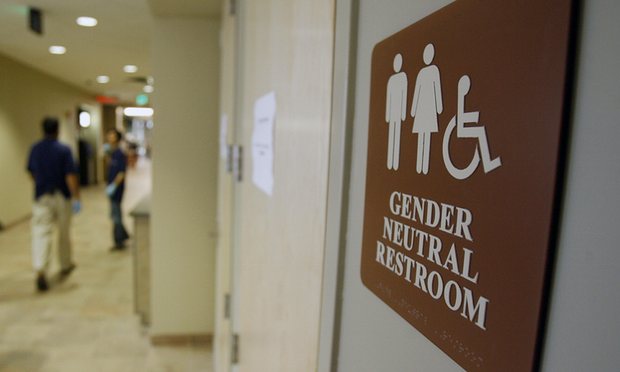
Americans are divided over whether transgender people should be allowed to use the public bathrooms of the gender with which they identify or the gender they were born as, according to the results of a CBS News/New York Times poll released Thursday.
Nearly half—46 percent—said transgender people should be required to use the bathroom corresponding with their birth gender, while 41 percent said they should be able to use the restroom bearing the gender with which they identify.
he results are largely split along lines of party, ideology, region, and gender.
While 65 percent of Republicans said transgender people should use the bathroom of their gender at birth, 60 percent of Democrats said the opposite. And 49 percent of independents said transgender people should use the bathrooms corresponding with their birth identity, compared to 38 percent who said they should go to the facility with the gender with which they currently identify.
The White House last week issued a directive to public school districts urging them to allow transgender students to use the bathrooms and locker rooms that correspond with their gender identity, suggesting that those states whose districts do not comply would risk losing federal funding.
Regardless, 57 percent of all Americans surveyed said guidelines determining which bathrooms transgender students can use in schools should be left up to individual states and local governments, while 35 percent said the federal government should take the lead.
Presumptive Republican nominee Donald Trump has voiced support for leaving the issue up to the states.
The poll was conducted May 13-17 via landlines and cellphones, surveying 1,300 people with an overall margin of error of plus or minus 3 percentage points. Among those 1,300 surveyed, 378 identified as Republicans, 415 as Democrats and as 507 independents.



Expositores: Oscar Vidarte (PUCP) Fernando González Vigil (Universidad del Pacífico) Inscripciones aquí. Leer más
Una retrospectiva para entender los próximos cuatro años. Leer más
En la conferencia se hará una presentación de los temas más relevantes del proceso de negociación se llevó a cabo desde el 2012, así como del acuerdo de paz firmado entre el Gobierno colombiano y la guerrilla de las FARC a finales del 2016. Se analizarán los desafíos y las... Leer más
El Observatorio de las Relaciones Peruano-Norteamericanas (ORPN) de la Universidad del Pacífico es un programa encargado de analizar y difundir información relevante sobre la situación política, económica y social de Estados Unidos y analizar, desde una perspectiva multidisciplinaria, su efecto en las relaciones bilaterales con el Perú.
© 2026 Universidad del Pacífico - Departamento Académico de Humanidades. Todos los derechos reservados.

